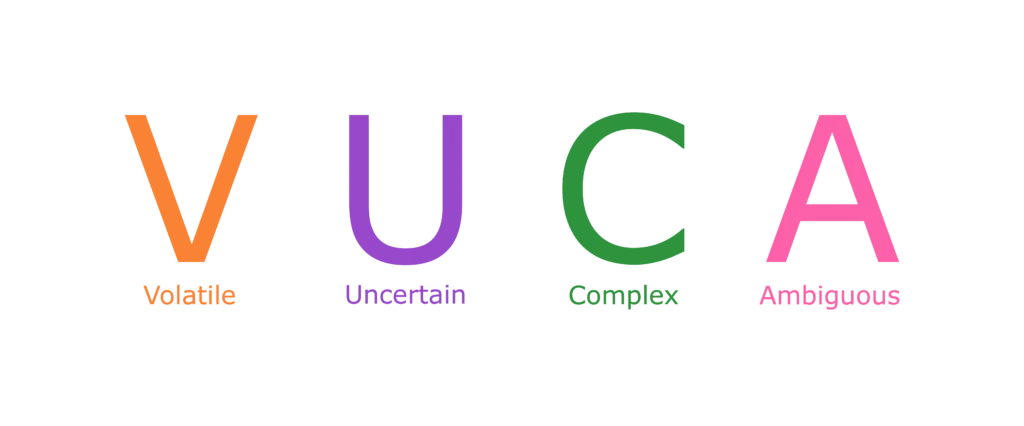VUCA is a term used to describe our fast changing contexts in which it is difficult to be comfortable and confident in the decisions we make. VUCA stands for volatile, uncertain, complex, and ambiguous, and originates from the U.S. Army. Summary by The World of Work Project
VUCA
The acronym VUCA originally emerged from the U.S. Army War College in the late 1980s and early 1990s in response to the collapse of the USSR.
During the heights of the cold war, the “Eastern Bloc” could be thought of as “one enemy”, with a clear set of objectives, approaches and leadership, making it possible to predict actions and counter-actions with some level of confidence. The dissolution of the Soviet Union and the end of the Cold War dramatically altered the global strategic landscape, presenting new challenges that were vastly different from the previously more predictable bipolar world order.
The VUCA framework was specifically designed to help military leaders and strategists understand and navigate this new and less predictable world. It aimed to provide a lens through which military leaders could view challenges and opportunities in strategic environments characterised by: Volatility, Uncertainty, Complexity, and Ambiguity.
Though VUCA was defined in relation to a geo-political and military context, the key characteristics of an environment that it brings to life and just as relevant in the fast changing, modern business world, as are the lessons it provides in relation to leadership and strategic thinking.

Volatility
Volatility refers to the speed, volume, and magnitude of change. In a volatile environment, changes happen suddenly and are often of significant intensity.
From an organizational perspective, leaders frequently face challenges such as fast changing supply prices, labour availability, interest rates and so on, as well as political and regulatory instability in some cases.
All of this volatility means organizational leaders need to adopt flexible strategies, responsive action plans and sole level of organizational resilience in order to succeed.
Uncertainty
Uncertainty refers to the lack of predictability in issues and events. With incomplete information, it’s difficult to anticipate outcomes. It feels a bit like the sands are shifting beneath you and it’s hard to figure out what is coming next.
From an organizational perspective, leaders should enhance their analytical capabilities and adopt a proactive approach to future-proof their operations. But they also need to have the ability to adjust and respond when things don’t go to plan. They may even need to play multiple positions and adopt multiple strategies at the same time so that they hedge their positions in response to uncertain futures.
Complexity
Complexity in this model refers to the fact that there are often many different factors in play in the situations we find ourselves in. In fact, we often find ourselves operating in complex, systemic environments with many inputs and internal processes, all of which can materially affect our outcomes.
In complex systems like this, small changes to inputs and processes can have large impacts on outputs, and it’s nearly impossible to fully analyse what is happening and to confidently predict outcomes.
Many organizations will experience this as they are often one entity in a complex ecosystem of a market, and they are made up of many systems loosely joined together.
To manage well in this type of context, organizations benefit from adopting a systems thinking mindset, searching for data, trying to find the signal in the noice, increasing their communication levels and remaining agile and responsive.
Ambiguous
As if that all wasn’t hard enough, ambiguity is often also at play in our modern organizations.
Ambiguity here simple means that there is a lack of clarity about how to interpret something.
With ambiguous information, the past may not be an accurate predictor of the future, and what worked before might not work now. In other words, the data we have is telling us multiple and potentially conflicting stories, making it hard to interpret.
What does this all mean for leaders?
Many organizational leaders relate to the VUCA context and work to evolve their organizations to thrive despite the VUCA nature of the world.
Some of the strategies that help organizations survive in a VUCA context include:
- Increasing organizational resilience and flexibility,
- Encouraging a culture where change is expected and responded to quickly and smoothly,
- Strengthening an innovation mindset and organizational approach to innovation,
- Promoting continuous learning,
- Laying the foundations for agile responses to sudden shifts in the environment,
- Improving the clarity and speed of communication (both up and down),
- Developing robust risk management and contingency strategies,
- Creating great places to work with resilient teams,
- Potentially flattening their structures and hierarchies, providing more autonomy to individuals closer to emerging situations so that they can act quickly,
- Being proactive, focusing on values and being clear on their organizational vision.
Learning More
Being comfortable and making decisions in an unpredictable world is hard. You might enjoy checking out Bounded Rationality and Maximizing vs Satisficing as some starting points, as well as the Circle of Influence concept.
A personal model of change like the Bridges model might also be interesting, as well as the dual process (system 1 and 2) theory of our brains.
From a leadership perspective, we find John Adair’s Action Centered Leadership (which we’ve not written about yet) a helpful tool for guiding leaders to focus on what matters in a VUCA environment.
You might also enjoy this podcast on Psychological flexibility, which sheds some light on how to manage our own unhelpful thoughts and feelings when they arise.
The World of Work Project View
We think VUCA is a really useful model. The phrase is pretty catchy and memorable, and it’s a great little tool to help leaders and managers reflect on the context they are operating in.
There is a lot of anecdotal evidence that the world is becoming ever more “VUCA”. Be it reports from big banks, governments and consultancies on the pace of change (there will be as much in the next 5 years as there has been in the last 100 years) or individuals recent experiences in the world (Covid, Ukraine, Interest rates), people find VUCA to feel fairly intuitively accurate.
Once people connect with the concept, the challenge is then how do we thrive in a world like this. And that challenge is two fold: how do organizational and team leaders navigate their teams through this well, and how do individuals cope and thrive in a world like this. They’re different questions, but some of the answers are the same. And they’re great questions to ask groups and participants in workshops to explore, all kinds of great things emerge when you do.
From our perspective the meeting point of these challenges is in acceptance that we can’t really be certain. Instead, we can become more comfortable being uncertain and develop approaches to navigating this discomfort more effectively.
How We Help Organizations
We provide leadership development programmes and consulting services to clients around the world to help them become high performing organizations that are great places to work. We receive great feedback, build meaningful and lasting relationships and provide reduced cost services where price is a barrier.
Learning more about who we are and what we do it easy: To hear from us, please join our mailing list. To ask about how we can help you or your organization, please contact us. To explore topics we care about, listen to our podcast. To attend a free seminar, please check out our eventbrite page.
We’re also considering creating a community for people interested in improving the world of work. If you’d like to be part of it, please contact us.
Sources and Feedback
Most of this has just been picked up from our work with clients.
It might be worth reading: Bennett, N., & Lemoine, G. J. (2014). What VUCA Really Means for You. Harvard Business Review, 92(1/2), 27-28.
PLease let us know if you think we should reference something else and we will.
We’re a small organization who know we make mistakes and want to improve them. Please contact us with any feedback you have on this post. We’ll usually reply within 72 hours.






